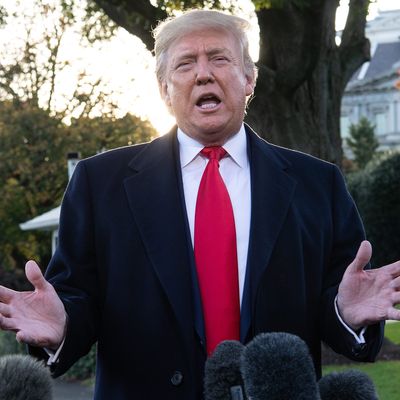
And now Republicans have arrived, at last, at their final defense. Sure, President Trump may have demanded Ukraine investigate his domestic rivals, and sure, there may have been some kind of conditional that-for-that trade that could be summarized in a Latin phrase. But it’s all okay because Trump was trying to root out corruption. He said so himself.
“The Volker/Sondland transcripts lay it out,” writes Representative Mark Meadows in the wake of transcripts proving beyond a doubt a quid pro quo, “@realDonaldTrump wanted to clean up corruption in Ukraine, and ensure taxpayer funded aid wasn’t going to corrupt causes.” Republican senator John Kennedy recently pleaded that Trump “honestly believes that there may have been corruption in Ukraine, and before he turns over $400 million of American taxpayer money, he’s entitled to ask.”
The Republican Party is on the precipice of endorsing Trump’s claim that he has an “absolute right” to push any country to investigate corruption. He just has to “honestly” believe, or at least claim to honestly believe, that the alleged corruption is real.
Even if Republicans believed in Trump’s sincerity, they would be handing the occupant of the White House powers inviting easy abuse. If a president can use the enormous weight of American diplomatic leverage to gin up probes against Americans who oppose him, and only his honesty limits his ability to use this power as a partisan cudgel, then we are at the mercy of the president’s good faith. Historically, that seems like a risky bet.
In reality, of course, there’s no reason whatsoever to believe that Trump has any sincere interest in rooting out corruption per se. In any context other than discrediting his political rivals, Trump’s stance on corruption ranges from total lack of concern to active encouragement. He has openly stated that he believes the attorney general can and should cover up actual crimes by a president. (He told the New York Times that Obama’s Justice Department facilitated actual crimes by Obama and was correct to do so: “Holder protected the president. And I have great respect for that, I’ll be honest, I have great respect for that.”) Trump boasted to his advisers that when Turkish president Recep Erdogan protested that a matter Trump was lobbying him over was being handled by the Turkish justice system, he replied, “Bullshit, a justice system. You own the justice system.” Trump has forged closer ties with Russia, Saudi Arabia, and other notorious kleptocracies without expressing any concern about corruption whatsoever.
Even Trump’s ask to investigate “corruption” in Ukraine was structured specifically around a demand for a public announcement of an investigation. Why does it have to be public, if Trump just wanted Ukraine to look into misconduct? Because, obviously, he wanted the “investigation” to generate news that would implicate the FBI and the Bidens. Also, if Trump was concerned about “corruption,” it seems like a weird choice to deputize as his investigators a couple of crooks tied in with the Russian mafia, who were also looking to make themselves some money while they “uncovered corruption.”
Indeed, Trump himself makes it perfectly clear that “corrupt” is simply a label he uses to describe his political opponents. He has called Nancy Pelosi and Adam Schiff “corrupt.” He has described the entire Democratic Party as corrupt (“Tomorrow you will vote to reject the Democrats’ extremism, socialism, and corruption,” he promised rallygoers before Tuesday’s elections). He has used the phrase for several members of the FBI, the mainstream media, Hillary Clinton, Barack Obama, and on and on.
Republicans are a little squeamish about openly saying, “Trump can push foreign countries to investigate his rivals.” Instead they say, “Trump can push foreign countries to investigate corruption.” But these two statements mean the exact same thing. The notion that Trump’s activity had any relation to legitimately trying to root out corruption is the biggest insult to our intelligence so far.






























